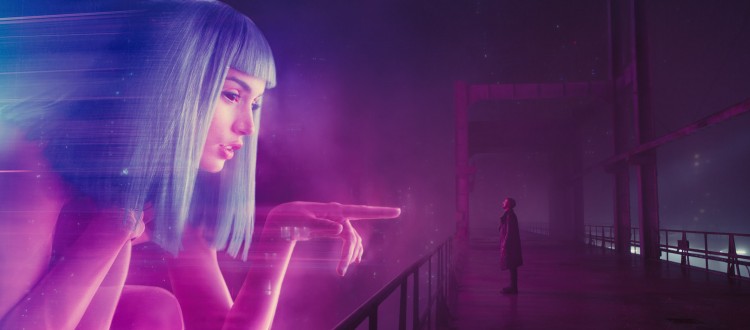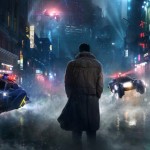Blade Runner 2049: Reviewed
Directed by: Denis Villeneuve
Starring: Ryan Gosling, Harrison Ford, Robin Wright, Dave Bautista, and Ana de Armas
If nothing else, Blade Runner 2049 is something beautiful to behold. The artistry to the narrative and visual story telling is utterly evocative of the original film’s sense of wonder and mystery. In spite of Ridley Scott plastering his name over the production, one must reject the notion of this movie as part of Scott’s oeuvre – and thank the gods for that fact.
This is a film that is very much an extension of Denis Villeneuve’s work in Arrival. While there is no denying Blade Runner 2049 as an odds-on favourite for peeking into our cyberpunk, dystopian future, it’s also a film that invites the audience to think, feel, empathize, and understand each other. As such, it’s sure to piss off a lot of people who lack any such capacity or are in possession of a petulant graduate student’s desire to find fault in everything, no matter how far removed their argument is from the context at hand.
In true noir fashion, Blade Runner 2049 is a detective story orbiting one cop’s very bad day. In this case, Officer K (Gosling), a replicant, unworthy in the eyes of his human masters of holding a proper name, is bound to serve humanity through a barely exposited but intuitively understood take on Asimov’s three laws (technically the exposition comes through a pre-release short film – that’s right, kids, there’s a bit of homework to this three-hour masterpiece). The euphemisms of police violence against artificial life (i.e. retirement) persist in this film, and the speculative tragedy of Rick Deckard’s (Ford) job back in 2019 (and 1982) is made manifest in this film’s first act; therein, K retires Sapper Morton (Bautista), a bug farming replicant, who fled the replicant-on-replicant proxy wars of the off-world colonies for a quiet life on Earth.
Morton’s death leads K and his police Lieutenant (Wright) to a mystery involving a familiar Nexus 6-model replicant who, back in the 2020s, shortly after fleeing LA with the titular Blade Runner, gave birth to a child. This is the moment, a scant ten minutes into the first act, when the intellectual property ceases to belong to Ridley Scott and becomes Denis Villeneuve’s dialogue with Philip K. Dick and the audience’s personal beliefs. It is a discourse not simply on what it means to be human, but what it means to be a good human.
Fundamental, but once quintessential, questions about who is human and who is a replicant, who is real and who is pretend, are sophomoric things for this movie. There are richer, deeper questions to parse within K’s Herculean labour. For example, can two machines truly feel love for each other when both are programmed to obey their masters?
Both K and Joi (de Armas) were created and customized to serve a (biological) human purpose. Both are aware of what they are, replicant and hologram, respectively, and product lines, collectively. Yet neither despair their existence. Because of that agency, the audience’s sympathies aren’t commanded to follow a single path. One person could look at Joi and K and see a love story; another could see a story on the commodification of women’s bodies; a third could see the two characters as studies in opiates to labour exploitation. None of those interpretations are wrong, nor are any inherently better than others.
Thus I feel content to put a bracket around the technical perfection of this movie – the union of soundtrack, images, acting, and imagery to convey a sense of wonder and oppression – and focus a reader’s attention toward the endless, twisting avenues of thematic inquiry as the genius of Blade Runner 2049. Nobody would be wrong to engage the film on a purely aesthetic and plot-driven level, nor should anyone suggest those elements are shallow in their execution. But, to mobilize the language of the film, the miracle of Blade Runner 2049 is in its gentle request for the audience to do more.
Blade Runner 2049 is a movie engineered to be immune to hot takes, snark, and vapidity. We are expected to engage all of our emotion, all of our cognitive resources in the pursuit of a personal truth within the films set pieces. We witness not simply the story on screen, but live, long after the credits have rolled, with the implications and imagined consequences of this most human story. Dare I propose we could be made better for the experience? Amid the endless conversations about if this sequel was necessary or needed, Denis Villenueve found a third way. He presented us with a story that studied artificial life and asked if we, as humans, are necessary. It is a step back from the nihilism of Battlestar Galactica. Rather, Villenueve asks a question about how humans will fit into a world where our creations are better at being human than their creators – a place where parents are a burden on their children. The question, despite the setting and tone, is not bleak or pessimistic. It is, in my humble estimation, something meant to be aspirational for anyone with the courage to see the film on this level.












Articulate and heartfelt. I didn’t think I could want to see this film more than I already do. Your review describes exactly the kind of Sci-Fi film I have been looking and waiting for since the original Blade Runner was released.
Thank you.